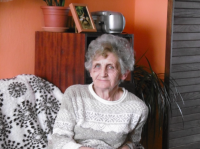The worst part was that we went into the complete unknown
Download image
Zdeňka Dudrová was born in Prague’s Apolinář maternity hospital on 21 February 1939 as the daughter of Václav Polívka and Otýlie Polívková, farmers in Bříza near Roudnice nad Labem. During World War II, her parents helped the families of imprisoned resistance fighters, provided them with food and took care of their children. After the communist coup in 1948, Václav Polívka was labelled a kulak, not admitted into the cooperative which he wanted to join voluntarily, and found himself under mounting pressure. In 1952 he was accused of sabotage and held in detention for three months. Thanks to a favourable testimony of the chairman of the MNV and the local organisation of the Communist Party of Czechoslovakia, he was not convicted, but the family had to vacate the farm. On 16 June 1953 they were forcibly relocated to Henčov near Jihlava. Zdeňka finished primary school and began studying at a secondary medical school in 1954, which she completed in 1957. In 1958, she married Milan Dudr, also the from a displaced farmer family. In 1968, the family sought the return of their house in Bříza, but their hopes were dashed by the Warsaw Pact troops invasion of Czechoslovakia. Zdeňka Dudrová worked as a nurse in an oncology ward for nineteen years and then in a children’s convalescent home. Her father died in 1961, her mother in 1984. In the 1990s, Zdeňka Dudrová and her brother Václav Polívka were returned the farmhouse in Bříza. The house was in poor condition, with tenants who could not be evicted. Zdeňka had the building repaired at own expense, and while she still lives in the Jihlava region, she does not want to sell the house in Bříza as long as she lives.
